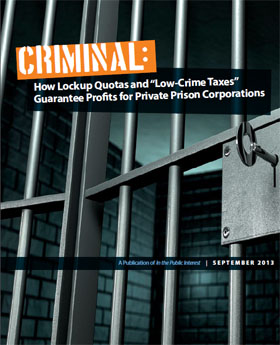NATIONAL
When you require prison beds to be filled, politicians fill them
The following article by Kenneth Quinnell is crossposted from AFL-CIO Now:
In a song called “New Slaves” from his recently released album, controversial rapper Kanye West includes the following lyrics:
Meanwhile the DEA, teamed up with the CCA
They tryna lock ****** up, they tryna make new slaves
See that’s that privately owned prison, get your piece today
(Here’s West performing the song on SNL. Warning: Explicit lyrics.)
In the song, West refers to a problem that is becoming recognized as one of major importance to America’s working families focused on fairness and civil rights — the growth of the private prison industry and the extreme lengths that the corporations that dominate the industry will go to pad their own profit margins, regardless of the effect it has on families and communities across the nation.
At the AFL-CIO’s quadrennial convention last week, the delegates passed a resolution recognizing the scope of the problem and calling for action:
It is no coincidence that the total population in the United States’ correctional system has exploded in the decades since the business of for-profit incarceration was born. Between 1980 and 2011 the number of people incarcerated grew from 500,000 to 2.2 million. The rise in the rate of incarceration has had a disproportionate impact on individuals and communities of color. According to a 2008 study from the Pew Center on the States, one out of every 106 white males ages 18 or older is incarcerated, one out of every 36 Hispanic males ages 18 or older is incarcerated and one in every 15 black males ages 18 or older is incarcerated. In many of the largest cities in the United States, more than half of young black men are either in the correctional population or released but now stigmatized with a criminal record.
AFL-CIO President Richard Trumka made it clear these policies aren’t just about crime but about race, too:
….The first time I toured a prison, the most striking thing I saw—and I already knew the statistics, but it’s a whole different thing to see with your own eyes—was how absolutely packed our prisons are with young black and brown men. We’re not locking up individuals as much as a demographic.
And that, right there, is the result of bias. It’s the result of prejudice. And it’s wrong.
 A new report released today by In the Public Interest (ITPI) reveals some disturbing facts discussed in the AFL-CIO resolution. ITPI examined the contracts that the two major private prison corporations have with various states and found some disturbing elements. More than 65% of the contracts with Corrections Corporation of America (CCA) and GEO Group included occupancy guarantees that require states to keep prison beds full at high quotas or states have to pay the companies significant amounts of taxpayer funds for failing to incarcerate enough of their own citizens. In those contracts, states are required to keep the prison beds filled at rates between 80% and 100%, with 90% being the most frequent standard. Effectively, ITPI argues, this amounts to a “low-crime tax,” where states that do what is nearly universally accepted as a social positive — keep crime rates low — must pay a fee.
A new report released today by In the Public Interest (ITPI) reveals some disturbing facts discussed in the AFL-CIO resolution. ITPI examined the contracts that the two major private prison corporations have with various states and found some disturbing elements. More than 65% of the contracts with Corrections Corporation of America (CCA) and GEO Group included occupancy guarantees that require states to keep prison beds full at high quotas or states have to pay the companies significant amounts of taxpayer funds for failing to incarcerate enough of their own citizens. In those contracts, states are required to keep the prison beds filled at rates between 80% and 100%, with 90% being the most frequent standard. Effectively, ITPI argues, this amounts to a “low-crime tax,” where states that do what is nearly universally accepted as a social positive — keep crime rates low — must pay a fee.
In 2012, CCA sent a letter to the governors of 48 states offering to buy and operate each state’s largest prisons in exchange for a 20-year contract with a required 90% guarantee for bed occupancy. No state took them up on the offer, but many states already had similar contracts for private prisons that do the same thing. The contracts incentivize states to make harsher laws with lengthier sentences. Added to that is the fact that CCA and GEO Group spent massive amounts of money lobbying for these harsher laws and in electing politicians who will keep those prison beds filled:
The Center for Responsive Politics reports that CCA spent $17.4 million in lobbying expenditures from 2002 through 2012, while GEO Group spent $2.5 million from 2004 to 2012. Similarly, CCA spent $1.9 million in political contributions from 2003 to 2012, and Geo Group spent $2.9 million during the same time period.
 These companies also do a poor job at staffing the prisons they run in their never-ending quest for higher profits. They cut corners and staffing and create dangerous conditions for both prison employees and inmates. At an Arizona prison, the Marana Community Correctional Treatment Facility (MTC), with a 100% occupancy rate, for instance, problems were widespread:
These companies also do a poor job at staffing the prisons they run in their never-ending quest for higher profits. They cut corners and staffing and create dangerous conditions for both prison employees and inmates. At an Arizona prison, the Marana Community Correctional Treatment Facility (MTC), with a 100% occupancy rate, for instance, problems were widespread:
Despite MTC’s guaranteed revenue, the Marana facility has been plagued by safety problems. In a security review in August 2010, state inspectors found broken security cameras, swamp coolers out of commission, insecure doors and windows on housing units, inadequate perimeter lighting and broken control panels that failed to alert staff when inmates opened exterior doors. When inspectors returned in March 2011 to perform the annual audit, problems persisted, including broken security cameras and control panels.
The problem is even more extreme at other locations. CCA was recently held in contempt of court for failing to adequately staff a prison in Idaho and falsifying documents related to staffing, after it was discovered that mandatory security posts were left vacant for at least 4,800 hours. Another lawsuit dealing with the same prison alleged that CCA partnered with gangs and used gang violence to gain control over the inmate population.
The AFL-CIO resolution called for action to address these issues:
- The AFL-CIO believes that the operation of our criminal justice system is an inherently governmental function. The AFL-CIO will support legislation, policies and practices that end the privatization of correctional facilities or services.
- The AFL-CIO will support efforts to alleviate prison overcrowding by advocating for adequate staffing for correctional institutions and the conversion of privately operated prisons to public operation.
- The AFL-CIO will support criminal sentencing policies that ensure punishments are fair, commensurate with the crime and consistent with public safety requirements. The AFL-CIO will oppose legislation and policies that require inappropriately long mandatory sentences for nonviolent crimes.
- The AFL-CIO will support reforms—including adequate staffing of our criminal justice system—that accelerate the justice process and eliminate unnecessary pre-trial detention time.
- The AFL-CIO will support the effective use and full funding of training, education, probation and parole strategies that assist in reintegrating people who have served their time into our communities.
- The AFL-CIO will support a public policy focus on the treatment of users of illegal drugs and supports treating drug use as a public health issue.
- The AFL-CIO will support the restoration of full citizenship rights for those convicted of nonviolent offenses once they have completed their prison sentences, including the right to vote, the right to serve on a jury and full access to government services such as financial aid for education, housing and employment assistance.
- The AFL-CIO will work with affiliates and allies to support legislation and policies that support schools and communities in developing and funding programs to reduce the number of young people who drop out of school or are suspended or expelled and will support programs, such as DARE, that work with law enforcement officers to educate rather than penalize youth.





